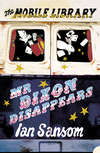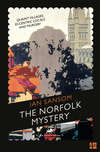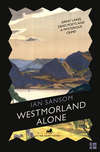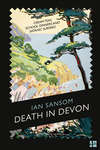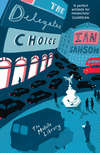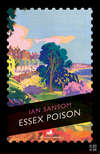Loe raamatut: «Mr Dixon Disappears»
The Mobile Library
Mr Dixon Disappears
Ian Sansom

For Sean
2005–2006
R.I.P.
Table of Contents
Cover Page
Title Page
1
2
3
4
5
6
7
8
9
10
11
12
13
14
15
16
The Mobile Library
Acknowledgements
About the Author
Also by Ian Sansom
Copyright
About the Publisher
1
He was sick of the excuses and the lies. He was tired of the evasions and the untruths, of people refusing to stand up and speak the truth and take responsibility for their own actions. It seemed to him like yet another symptom of the decline of Western civilisation; of chaos; and climate change; and environmental disaster; and war; disease; famine; oppression; the eternal slow slide down and down and down. It was entropy, nemesis, apotheosis, imminent apocalypse and sheer bad manners all rolled into one.
People were not returning their library books on time.
‘I’m sorry, I forgot,’ people would say.
And, ‘I’ve been in hospital.’
Or, ‘I liked it so much I lent it to my sister.’ (Or my brother, or my mother, or my father, or my cousin, or my friend, who lives up country, or in Derry, or over there in England, actually, and isn’t that where you’re from?)
Or, ‘Sure, I brought it back already.’
Or, ‘No. I don’t think so. I never had that one out.’
Or, ‘I put it back on the shelves myself. Some other one must have it out now.’
Or, ‘Someone stole it.’
Or, ‘I left it on the bus.’ Or in the bath, or on holiday, or in the car and it’s in for servicing.
And, even, once, ‘It was a bad book, full of bad language and bad people doing bad things, so I threw it away.’ (Well, what the hell did Mrs Onions expect, borrowing Last Exit to Brooklyn? Israel had asked her, after he’d got her to pay the replacement cost of the book, and a fine, and had steered her safely back towards her usual large-print romantic fiction, and it turned out she had a cousin who’d emigrated to New York back in the sixties and she’d never visited and she was toying with the idea of a trip over for her seventieth birthday and she’d wanted to find out what it was like over there, and frankly, there was no chance of her visiting now after reading that filth, they were going to go to Donegal for a few days instead, to see her sister, down in Gweedore, which was quite far enough, and did Israel know if Frank McCourt had written any others?)
But mostly when they were challenged about their overdue or unreturned books, the good people of Tumdrum would just narrow their eyes and look at you with a blank expression and purse their lips and say, ‘Book? What book?’
It wasn’t funny. It was cracking him up.
He patted his face with cold water and stared at himself, freshly shaved, in the mirror hung on a nail above the makeshift sink.
He squinted at himself.
In his teens and even into his early twenties Israel had spent a lot of time looking into mirrors, trying to work out whether he was good-looking or not, which was quite a project, a hobby almost; he could have spent hours at it. Was his nose perhaps a little too large, his eyes a little too narrow, his lips too full, his ears not quite right? Pressing, important and immense as those questions had once appeared to be, they no longer seemed to bother him, he didn’t know why – he supposed that maybe there comes a time in every man’s life when he makes up his mind and decides one way or another about the cut of his own jib and has to learn to live with it, and maybe he’d reached that point, or maybe Tumdrum had just cured him of himself. Either way, it didn’t seem to bother him any more, the question of whether he was good-looking or not. What bothered him now was: am I there at all? Or, where am I? He often found himself glancing at himself in the wing-mirror of the van, trying to catch himself out, trying to locate himself, checking for signs of life.
He tried to think who it was he reminded himself of: his father? No. Not his father. Israel was too wide and too plush, too messy: the glasses; the nose; the unruly hair. His dad had always been well turned-out; he was more sports-casual, his dad. Israel reminded himself more of the father of one of his best friends from school, a man who was an art lecturer at a sixth-form college, a tense, fragile, bitter man who wore cords during the week and who had books in the house and who sometimes listened to jazz and blues, and who drank wine to excess, and because Israel’s own dad was just a boring old accountant and a moderate man and pretty much happy with his lot in life and with his pastel pullovers and his slacks, it was this stubbly, corduroy-wearing, French-film-watching saddo who had come to represent what Israel thought of as the fully-formed adult male: a copy of Miles Davis’s Kind of Blue and empty wine bottles and the smell of freshly ground coffee; his friend’s dad had made north London seem like the Left Bank, which was where Israel had always assumed he would end up himself, sitting at a café table eating croissants and writing meditative works of philosophy.
But instead he was here, in Tumdrum, in his lodgings, in the converted chicken coop on the Devines’ farm, and he looked down at the ground, down past his big white buttery belly and his cords – an old pair of Mr Devine’s, phosphorescent cords, cords with a nap and shine like the glint of green on mouldy ham – and there were empty wine bottles stacked everywhere in the room, under the bed and on the dresser – Tumdrum not having yet caught up with recycling – and he had to admit, as he was getting older he was becoming partial to a bit of Miles Davis himself, and he liked his coffee in the mornings just so, if he could have got hold of fresh coffee in the mornings. He wasn’t even thirty and he’d become his best friend’s dad.
He prodded his little round glasses up onto his forehead and rubbed his chin: it felt horrible, like touching a slightly damp shrink-wrapped skinless chicken breast from Marks and Spencer; not that he had touched a shrink-wrapped skinless chicken breast from Marks and Spencer for a long time, what with being a vegetarian and also being stuck in the middle of the middle of nowhere in the north of the north of Northern Ireland and having to drive around in a mobile library which by rights should have been scrapped and made into a novelty public sculpture years ago.
So, god.
He was still here, Israel Armstrong, BA (Hons), and just about the only thing that was keeping him sane was lovely Rosie, Rosie Hart from the First and Last, who’d been helping him out on the mobile in an unofficial capacity. It was a casual sort of arrangement, but it seemed to work. On the days when Ted was busy with his taxi firm (‘Ted’s Cabs: If You Want To Get There, Call the Bear’), Rosie would come in and give Israel a hand, and help him get loaded up, and sort out the tickets and clear out the van, and help him find the service points and issue the books, and she was in many ways the ideal helpmeet and librarian: she was young and presentable, and she didn’t eat garlic, or shake, or suffer from dyspepsia, or rage, or otherwise exhibit any eccentric or anti-social behaviours, and her bartending experience meant that she was fair but firm and she had an instinctive way with people, while Israel, on the other hand, could sometimes come across as a little…brusque. He knew it himself. He wasn’t proud of it.
If someone came in to the mobile, for instance, a borrower – or a ‘customer’ as Linda Wei, Deputy Head of Entertainment, Leisure and Community Services at Tumdrum and District Council insisted on calling them – and they asked for a book, Israel would always start out with good intentions. He’d say, ‘Hello! Welcome!’ and try to be as cheery as a mobile librarian might reasonably be expected to be, and he might even ask the person if they knew the title of the book they were after, but invariably the person – let’s call them Mrs Onions, for the sake of example – would say ‘No,’ and Israel might manage to remain patient for a moment or two and he might say, ‘OK, fine, do you know the name of the author?’ but then of course the person – let’s say still they’re Mrs Onions – would say, ‘Och, no,’ and Israel would start to struggle a little bit then and the person, Mrs Onions would usually add, ‘But you’d know it when you saw it, because it’s got a blue sort of a cover, and my cousin had it out last year I think it was, and it’s about this big…’, at which point Israel would lose interest completely, would be incapable of offering anything but his ill-disguised north London university-educated liberal scorn for someone who didn’t know what they wanted and didn’t know how to get it. But Rosie, Rosie would take it all in her stride and she’d try to find every blue-coloured book in the van and if they didn’t have it in, sure they could get a few blue-coloured books on inter-library loan, it was no problem at all. Israel just couldn’t be bothered with all that; Israel liked the idea of public service, but he struggled with being an actual public servant.
Rosie, though, she was a saviour. She was really something special, Rosie. Israel liked Rosie a lot; he couldn’t deny it. She reminded him of someone. She reminded him of his girlfriend, in fact, Gloria, back home in England.
There were of course things about Rosie that Israel didn’t like; you couldn’t spend much time with someone on a mobile library and not get annoyed and irritated by their little tics and habits. The mobile library after all was really no more than a giant rabbit hutch, or a book-lined prison cell, a place of strictly limited human dimensions; you couldn’t wave your hands around too much in the mobile without knocking something over. In the mobile library you lived life, but in miniature, and you minded any hot liquids.
Israel didn’t like the way Rosie ate chocolate, for one thing: the way she’d just pop a piece of chocolate in her mouth, and cheap chocolate too, and munch on it like a chipmunk, unapologetic, and so fast. Back home in London Gloria never really ate chocolate—’ A moment on the lips, a lifetime on the hips,’ she’d say patting her little wasp-like waist – and if she ever did eat chocolate, she only ever ate Green and Black’s, a tiny little square. Rosie also had the habit of applying her make-up in the library, even when there were borrowers in, as if she were in the privacy of her own home; Gloria would never have done anything like that. Israel had lived with Gloria for – what? – four years before coming here and he had never seen her apply her make-up in public. He wondered, now, thinking about it, if she had some kind of magic make-up that never needed reapplying. Or maybe he just wasn’t paying attention.
Rosie also smoked and chewed her fingernails, and these were bad habits by any standards, but Israel didn’t mind; his were only mild dislikes, after all, in the grand scheme of things, and they were consistently outweighed by the many things he did like about Rosie. He liked the fact that she had a slightly bloodshot right eye, for example, which she claimed was from having suppressed a sneeze and burst a blood-vessel, and which made her look…interesting. He liked the fact that she never finished a novel, that she would jump around from book to book, and would fold down the corners and cram the books into her shoulder-bag, wrinkling and wrecking the covers – Memoirs of a Geisha covered in lipstick and crushed to a pulp – because he would never have done anything like that himself; he’d always been a completionist; he had to finish a book once he’d started it; it seemed like bad manners not to, like not finishing the food on your plate.
Rosie was a breath of fresh air.
‘Why do people read all this rubbish?’ he’d complain when they were issuing books.
‘Relax, Is,’ she would say. She always called him Is – and he liked that too. ‘Who cares?’
‘Do people not want to improve themselves though?’ he’d say.
‘Not necessarily. People don’t just read books to improve themselves.’
‘Well, they should do. They should be reading Emerson or Thoreau or something.’
‘Why?’ she’d say. ‘What did they write?’
‘Books!’ he’d say. ‘Important books!’
‘And are they dead?’
‘Yes, of course!’
‘Well, there you are then. No one wants to read books by dead people.’
‘What?’
‘It’s depressing.’
‘It’s not depressing. It’s…that’s…Two thousand years of human civilisation.’
‘Live and let live,’ Rosie would say. ‘You can read Everton and Throw if you want.’
‘Emerson and Thoreau.’
‘Yeah. Right. Tea?’ she’d say.
And, ‘OK, yeah,’ he’d say, defeated, and that would be that.
He liked the way Rosie drank her tea and coffee. He liked her broad swimmer’s shoulders, and her hippyish kind of dresses. He liked the way she tucked her thick dark hair behind her ears, and the way sometimes when he arrived for her in the van she still had the towel around her head where she’d washed her hair, and she’d come anyway, drying her hair as they went. He liked the way they’d be sitting in the van and waiting for a borrower, and they’d just talk and time would pass. And he liked…Well, he liked her a lot.
Not that there was anything between them. There was absolutely nothing between Israel and Rosie. It was important to make that clear. Rosie had an ex, the father of her son, Conor, and Israel had Gloria – who was coming over to stay next weekend, coming all the way over, finally, finding time in her busy schedule.
Israel and Rosie were just good friends.
He glanced at his watch, pulled on a T-shirt and his old tank-top, which he noticed was becoming a little ruched around the waist – it needed a wash – and as he shrugged on his duffle coat and did up his old brown brogues he had to admit maybe it wasn’t such a bad life.
He was paid to drive around beautiful, rural, coastal Irish countryside, with a van full of books and pleasant female company. Maybe life as an English, Jewish vegetarian, corduroy-wearing mobile librarian on the north coast of the north of Northern Ireland wasn’t so bad after all.
Look at yourself, Armstrong, he told himself, with a last glance in the mirror: you have nothing to complain about. Really, you don’t.
And he didn’t.
Until, that is, the disappearance of Mr Dixon from the Department Store at the End of the World.
2
It started with an argument. It was too early for an argument, far, far too early.
‘What d’ye think yer doin’?’
‘Sorry?’ It caught Israel off-guard.
‘Ye deaf, or what?’
‘No,’ said Israel. ‘No. I am not deaf.’
‘Well then.’
‘Sorry?’
Israel had the window wound down, and was staring the man full in the face, and the man did not look happy. Indeed, Israel guessed the man might never look happy; he had a profoundly unhappy kind of a look about him: it was the shaven head and the pierced eyebrow and the nicotine lips and the cigarette tucked behind his ear, and the Manchester United football shirt pulled tight over a hard-looking, family-haggis-sized pot-belly, and the dark, cynical look in his eyes. He looked like a man who woke up angry and went to bed incandescent.
‘Look, you’ve totally lost me I’m afraid,’ said Israel.
‘What. Do. You. Think. You. Are. Doing?’
‘I’m parking, which is not that easy, actually, without power steering and—’
‘Aye, all right, well, you can’t park there.’
Israel had pulled up the mobile library next to a large silver Mercedes.
‘Sorry, I—’
‘Ye blind?’
‘No. I am not blind. And I am not deaf, I—’
‘Can ye not raid then?’
‘Sorry. I didn’t catch that. Can I…’
‘Can ye raid?’
‘Raid?’
‘Aye, raid.’
‘Read?’
‘Aye.’
‘Read? Ah, read. Yes. Thank you. I can read, actually. In fact, as you’ll see, I’m driving the—’
‘Aye, right. So you’ll see that’s a reserved space. See, says here “RESERVED”.’
‘I just thought—’
‘Aye, well, you thought wrong.’
‘Couldn’t I just park here until—’
‘No.’
‘But—’
‘These spaces are reserved.’
‘Yes, but it’s only—’
‘I just said no. What’s the matter with ye? D’ye think I’m joking?’
The man had little flecks of spit – the real thing, real threat-phlegm, the stuff of demented dogs and monkeys – around his mouth, Israel noticed.
‘No. No. I don’t, actually. I don’t think you’re—’
‘Aye, right. Well. Move yerself on in this piece of crap.’ He pronounced crap as though with a double k.
‘But—’
‘Move. Her. On.’
‘OK. Fine. Sorry. Look.’ Israel stuck his hand out of the window in a rather feeble, placatory, let’s-shake-hands-and-make-up kind of a gesture. ‘I feel we’ve maybe got off on the wrong foot here. I’m Israel Armstrong.’
The man ignored his hand. ‘I know who you are. You were meant to be here half an hour ago.’
‘Ah, yes, few problems with the mobile on the way over. You must be the caretaker—’
‘Round the back.’
‘Sorry?’
‘Round. The. Back. You. Can. Parkee. Upee. Round. The. Back. Do. You. Understand?’
‘Yes.’
‘Aye, right. Good. I’ll go open her up for you.’
Oh, God.
Israel was getting a headache. He didn’t always have a headache these days – just every other day. Because, honestly, he was getting used to life around Tumdrum, he really was. Like a prisoner eventually becomes accustomed to his captors, and adults as they get older eventually have to learn to live with some slight stiffness and joint pain in the morning and a sense of perhaps having lost their way a little on the road towards manifest destiny.
‘Move!’
‘Yes. Just going,’ said Israel, grinding the gears.
And he was certainly getting used to the colourful locals and their charming and eccentric ways.
He hadn’t had any breakfast, that was Israel’s problem, a cup of tea before he left the Devines’ farm, which was hardly enough to sustain a growing young man like himself. Israel had lost a little weight since arriving in Tumdrum, due to the lack of readily available non-meat protein, but he still clocked in at a solid 36-inch waist and 16 stone, not hideously fat by any means, but big enough for people to refer to him as ‘big lad’ and to mean it. He’d worked up a sweat already this morning and could have done with a nice fried egg soda or maybe a big bowl of porridge with the cream off the milk. Or some Tayto cheese and onion crisps. Or maybe a nice croissant. No, don’t get him started on croissants, or pains au chocolat, or muffins: Israel fantasised about breakfast pastries. Fresh breakfast pastries were not readily available in and around Tumdrum, although the baker’s, the Trusty Crusty, did do a nice cinnamon scone; scones were about the closest thing Tumdrum had to fresh patisserie items.
He’d been working hard, up until midnight and up again since six, getting the van loaded. Today was the big day. Easter Saturday. Today was the first day of Israel’s first ever mobile library touring exhibition, his debut as keeper and curator of Tumdrum’s heritage and history. Today was the day when Israel got to unveil Tumdrum and District’s mobile-library-sponsored five-panel display showing the history of the famous Dixon and Pickering’s department store, which was celebrating one hundred years of serving Tumdrum and District, and indeed the whole of the north coast of the north of Ireland and beyond, keeping the local farmers and their wives supplied with polyester-cotton sheets, Royal Doulton figurines, and Early Bird Light Suppers in the Cosy Nook, the award-winning cafeteria on the first floor, where on a clear day it was possible to see Scotland while you ate your jumbo gammon panini (served with chips and a light salad garnish).
It might not seem like it to you or me, and it certainly wouldn’t have seemed like it to Israel six months ago, but today was the real deal, a genuine event, a happening around Tumdrum. Dixon and Pickering’s was about as famous locally as the Giant’s Causeway a little further up round the coast: it was the Harrods, the Selfridges, the Fortnum and Mason, the Macy’s, the Tiffany’s, the Woolworths and the Wal-Mart of North Antrim all under one roof, and it had survived and thrived where other family-owned department stores had failed; it had made it to one hundred. And now it was none other than Israel Armstrong, mobile librarian, who had been tasked and commissioned to help the store to commemorate the occasion in style.
Israel couldn’t deny it: he was honoured. And he also couldn’t deny it: he was maybe going soft in the head.
He drove round the side of the building to the back.
It was undoubtedly a lovely spot, right by the sea. Actually, it wasn’t by the sea, that didn’t do it justice: you couldn’t really say that Dixon and Pickering’s was by the sea; Dixon and Pickering’s was on the sea.
Dixon and Pickering’s official motto – which was printed boldly on all the shop’s plastic carrier bags, just below the company crest, an image of a lamb lying down with a lion in a bucolic scene also featuring fauns and nymphs frolicking beneath mountains by the sea – was ‘The Customer Is Always Right’, which was wrong, actually, in Israel’s experience round about Tumdrum and in Northern Ireland generally. In his experience around here the customer was almost always wrong, unless you wanted to make a big deal about it, in which case the motto should really be amended to ‘The Customer Is Always Right…Eventually’, or ‘…After Threat of Legal Action’.
Dixon and Pickering’s was known locally as the Department Store at the End of the World, which was an accurate description, in several senses: you could have picked up Dixon and Pickering’s and plonked it down off a dirt-track near an old gold-prospecting town in the middle of Alaska or in some as-yet-undeveloped remote province in China, and people wouldn’t have blinked an eye; put moose or fried rice on the menu in the Cosy Nook and it would have fitted in just fine; because for all its airs and graces Dixon and Pickering’s remained an outback kind of shopping experience.
Built in 1906, Dixon and Pickering’s still stocked items that other department stores had stopped selling quite some time back, around about the Second World War in fact – his and hers thermal underwear, and two-colour sock wool, and a full range of hearth-sets, and extending toast forks, and wind-up repeater alarm clocks, and paraffin lamps – and it looked as though, with a slight push, you might be able to topple this whole teetering mound of old stucco and kitsch and knick-knacks and watch it disappear under the Irish Sea’s big white waves. On a rough day the salt spray came right up over the stone walls of the car park and lashed at the store’s stone steps and the new disabled access ramp. People said that if you were to shop in Dixon and Pickering’s just once a week and parked down at the sea wall then your car would be gone in a year, eaten alive by salt and rust, like the proverbial cow in a bottle of Coke.
The building itself was three storeys high, wide and spreading, and painted a lurid carnation pink, with palm trees planted all round it: it reminded Israel of a giant plate of salmon blini with chives, and it certainly looked as though it belonged somewhere else, in Miami maybe, or on a fully loaded side table at a north London bar mitzvah party, and definitely not on the lonely north coast of Ireland.
There was absolutely no doubt about it: Dixon and Pickering’s was unique. Dixon and Pickering’s was undoubtedly – as one of the titles on the helpful A3-size laminated sheets of Israel’s five-panel touring exhibition pointed out – A Landmark and A Legend.
Israel parked up.
It was raining, of course. It was always raining in Tumdrum. Even if it wasn’t raining, not at that actual moment, then it was getting ready to rain, biding its time, waiting until you’d left the house without your coat and umbrella and you were more than halfway to wherever it was you were going so it was too late to turn back, and then whoosh!, suddenly you were wet right through.
It rained here all the time, but still it somehow caught you unawares, creeping up on you. If it was possible for weather to be duplicitous and undermining, then Tumdrum’s weather was: it was bad weather, morally bad weather; it was rain that left no visible trace, no puddles, only a deep-down damp, a remorseless damp that at first you couldn’t get out of your clothes and then you couldn’t scrub out of your skin and then you couldn’t dig out of your soul; the kind of damp that if you could have smoked it, you wouldn’t have known but already you’d be addicted.
And what was worse even than the soul-destroying rain was that around Tumdrum the sky always seemed to be the colour of the road and the road was always the colour of the sky, a grey, grey, grey, one of a million shades of grey that Israel knew by heart by now, and today, this morning, it still being early, the sky was a kind of beige grey, like the trim in the interior of a particularly nasty 1970s sports car, the shade of a soulless future.
The caretaker emerged from the back of the store and into the rain and waved Israel over.
‘Come on ahead then. I’ll show you where you’re setting up.’
‘Would you mind, just…’ Israel turned up the hood on his duffle coat and half-heartedly indicated back towards the van, to the bags of poles and panels for the display, but the caretaker had gone already. So Israel followed him up the stone steps and inside the famous big pink building.
The back entrance took you in through kitchenware and hardware, Panasonic bread-makers to the left of you, pop-up gazebos and battery display stands to the right. A worn but clean red carpet led through the store, up past linen and beds, skirting contemporary furniture and on through greetings cards, stationery, board games and leather goods until finally you reached the front entrance to the store, where, as is traditional, you could purchase gifts, watches, jewellery and crystal at the foot of a wide staircase which took you up to ladies’ fashions and accessories.
‘Here’s you,’ said the caretaker, indicating a tiny space between the sweeping staircase and a jumble of glass display cases featuring vases, decanters and earrings.
‘I don’t know if I’ll be able to squeeze everything…’
But the caretaker had gone.
Right, thanks.
Israel trudged back through the store – he was trudging because his old brown brogues were slowly breaking down, widening and splitting, the leather uppers and the smooth leather soles unable to contend with the fast pace, the pounding, and the never-ending dung of country living – and he prepared to unload the exhibition through the disabled access door at the back of the mobile library. Which was easier said than done.
The disabled access door was actually more likely to render you disabled than to ease your access: it was pretty stiff to open, where someone had rear-ended the van at some time, and when you did get it open you had to tie it back with a piece of string because the catch had gone, and the roll-a-ramp itself weighed a ton and was a bugger to fold up and down.
But then the whole van was just like that, and you got used to her eventually, and as long as you watched the oil, and the tyre pressure and the water, and kept her doors lubricated with petroleum jelly, and remembered not to use the full trigger on the petrol pump when you were filling her up, and had a couple of spare alternator belts on board at all times, and as long as you had a dedicated full-time mechanic on hand, then really she was no trouble at all. She took a little more care and maintenance than Israel’s mum’s old Honda Civic back home in London, but then you couldn’t get two thousand books and fully adjustable shelving in a Honda Civic – in fact, as far as Israel remembered, you’d be lucky to be able to get the weekly supermarket shop, a bag of sucky chocolate limes and a handful of CDs in a Honda Civic. To his surprise, Israel seemed to have outgrown little city runabouts. He’d grown accustomed to the van and to her big old-fashioned country ways; he’d got used to grinding the gears, and the uncomfortable, elevated driving position, and he’d grown accustomed to listening out for the little rattles and shakes that meant he needed to get Ted to take a look at the engine before the whole thing blew. As long as Israel didn’t have to touch anything mechanical, as long as everything was going smoothly, he was absolutely fine.
He checked his watch. Ted was supposed to be meeting him, but there was no sign of him. He was going to have to do it all by himself.
He eventually dragged all the display poles and panels out of the van and through the store and started setting up.
The caretaker had turned some music on, which was now flooding the huge empty spaces of the store, filling up every little crack, like grains of sand in a picnic or long white worms of Polyfilla from a tube. There was ‘Dancing Queen’ by ABBA, and Chris De Burgh’s ‘Lady in Red’, and Elton John’s ‘Candle in the Wind’, all played just below tempo, legato, and with humming low chords, each song bleeding into the other, with a generous use of alto sax and what sounded like a flugelhorn, or a muted flugelhorn, or maybe a nose-flute to carry the melody, a sound so mucousy and clotted it made you feel all bunged-up and fluey just hearing it. TV theme-tunes from the 1970s merged seamlessly with pop hits of the 1980s and the Beatles, the slow songs played too fast, and the fast songs played too slow. He had a headache before: now he was actually beginning to feel sick. His hands were sweaty.
Tasuta katkend on lõppenud.
